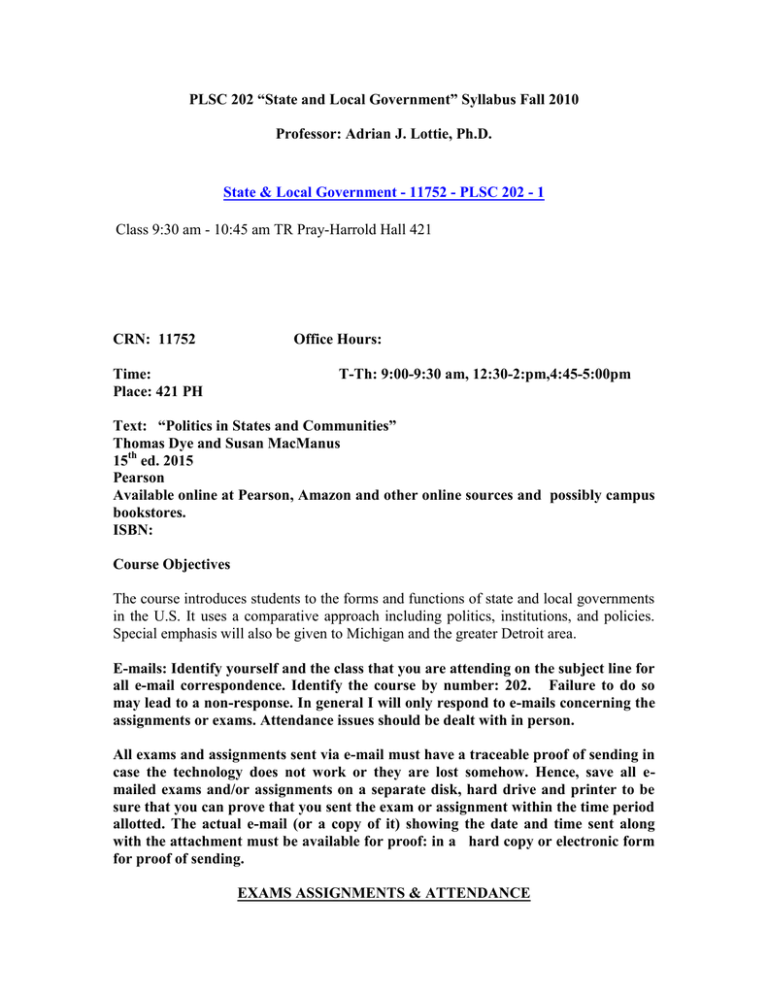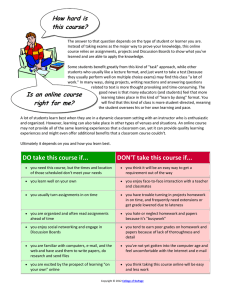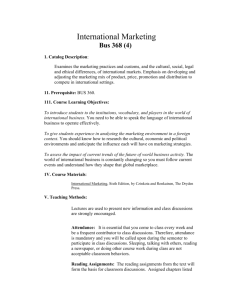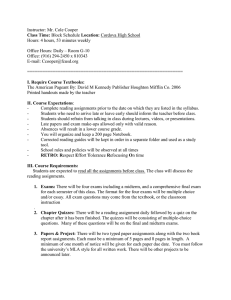PLSC 202 “State and Local Government” Syllabus Fall 2010
advertisement

PLSC 202 “State and Local Government” Syllabus Fall 2010 Professor: Adrian J. Lottie, Ph.D. State & Local Government - 11752 - PLSC 202 - 1 Class 9:30 am - 10:45 am TR Pray-Harrold Hall 421 CRN: 11752 Time: Place: 421 PH Office Hours: T-Th: 9:00-9:30 am, 12:30-2:pm,4:45-5:00pm Text: “Politics in States and Communities” Thomas Dye and Susan MacManus 15th ed. 2015 Pearson Available online at Pearson, Amazon and other online sources and possibly campus bookstores. ISBN: Course Objectives The course introduces students to the forms and functions of state and local governments in the U.S. It uses a comparative approach including politics, institutions, and policies. Special emphasis will also be given to Michigan and the greater Detroit area. E-mails: Identify yourself and the class that you are attending on the subject line for all e-mail correspondence. Identify the course by number: 202. Failure to do so may lead to a non-response. In general I will only respond to e-mails concerning the assignments or exams. Attendance issues should be dealt with in person. All exams and assignments sent via e-mail must have a traceable proof of sending in case the technology does not work or they are lost somehow. Hence, save all emailed exams and/or assignments on a separate disk, hard drive and printer to be sure that you can prove that you sent the exam or assignment within the time period allotted. The actual e-mail (or a copy of it) showing the date and time sent along with the attachment must be available for proof: in a hard copy or electronic form for proof of sending. EXAMS ASSIGNMENTS & ATTENDANCE There will be three examinations: mixed items covering the reading and discussions with emphasis on the discussions. No late and no make-up exams/assignments except in documented emergencies subject to the discretion of the professor. Late exams and assignments are graded ZERO unless waived. The odds of waiving an exam are near zero: only extenuating circumstances approved by the professor are accepted. Each exam will constitute 30% of your grade, and participation in classroom discussions/attendance 10%. Scale: 90-100=A, 88-89=A-, 86-87=B+, 80-85=B, 78-79=B-, 76-77=C+, 70-75=C, 68-69=C-, 60-67=D, 0- 59=F Assignments and/or exams must be saved and sent via e-mail attachment in the instructed format. Failure to do so will result in a ZERO grade for the assignment/exam. In general, the format for exams and assignments will be Rich Text Format due to its fungibility. Letter of Recommendation Policy Letters of Recommendation: Letters of recommendation, in general, will only be written for the top two to three students in this class when requested. Exceptions are rare and only provided in cases where the student's performance in another, relevant arena, known by the professor, warrants consideration. Academic Dishonesty: Any cheating, copying of another’s work, cheating on the exams, etc. will be addressed severely with strong consequences based upon university policies and the policies of the Office of Student Conduct and Community Standards. Study Tips for This Course 1. 2. 3. 4. 5. 6. 7. 8. 9. 10. 10. 11. Be inquisitive grades are important but learning is often the key to grades: try to learn something. Keep this syllabus in a permanent easy to access place: file cabinet, loose leaf notebook, At least each day that you plan to attend class and preferably each week day, review the syllabus. Imagine that you are an executive who has to manage every detail of your own affairs and consider this course one of your major projects and responsibilities. Read assignments before class. Invest at least two hours per day during the week for this course. Invest at least eight hours total in preparation for each examination. Review your notes and discussions regularly: do not wait for examinations to do so. Break down your writing/exam and when appropriate, discussion assignments into little pieces and work on the little pieces regularly, well in advance of due dates. Read the comments/notes by the professor and note comments by other students so that you are abreast of and aware of the “tempo/rhythm” of the class. Do not get behind during the semester: it is very difficult to keep up when you do. This is especially true for assignment deadlines. Attend class regularly: often discussions and materials are presented during class that are not available at any other time or place. These in turn are often subjects of exam questions. 1. Civility and academic honesty are required. Engaging in uncivil or dishonest behavior may result in disciplinary action against the offending student. Tentative Lecture and Discussion Schedule D& M Refers to Dye and MacManus Week 1 Week 2 Week 3 Week 4 Week 5 Week 6 Week 7 Week 8 Week 9 Week10 Week 11 Week 11 Week 12 Week 13 Week 14 Week 15 Ch 1 D&M “Politics in States and Communities.” Ch 2 D & M “Democracy and Constitutionalism.” Ch 3 D & M “Federalism.” Ch 4 D& M “Participation.” Ch 5 D& M “Parties and Campaigns.” Ch 6 D & M “Legislators.” Ch 7 D & M “Governors” Exam 1(take-home) Covering Chs 1-7. Ch 8 D& M “Bureaucratic Politics.” Ch 9 D& M “Courts and Crime” Exam 2 Covering Chs 8,9. Ch 10 D & M “Governing Communities” Ch 11 D & M “Community Politics” Ch 12 D&M “Conflict in the Metropolis” Ch 13, D& M “Land Use, Power, Environment. (Recess) Ch 14, 15 D& M “Taxation, Finance,” “Civil Rights” Ch 16 D & M “Politics of Education” Final Examination Due December 17, 2015 9:00am via e-mail attachment saved in Rich Text Format. ”Good Luck!!!



